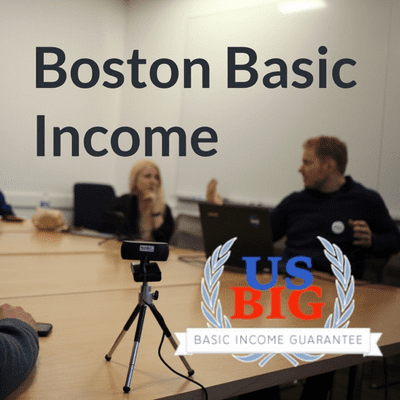
Boston Basic Income
Podcast af Alex Howlett
Hosted by Alex Howlett and Derek Van Gorder, Boston Basic Income is a weekly discussion that explores different topics as they relate to basic income (UBI). Basic income is a regular income unconditionally paid to every individual person. BBI is co-sponsored by the US Basic Income Guarantee Network (https://usbig.net) (USBIG) and Project Greshm (https://www.greshm.org).
Prøv gratis i 7 dage
99,00 kr. / måned efter prøveperiode.Ingen binding.
Alle episoder
24 episoderTo what extent is it possible to implement basic income independently from the government? What challenges and constraints might face such a system? Conrad Shaw joins us to discuss these questions as well as a new app he's working on called Comingle that hopes to achieve a privately-implemented basic income. Conrad has been a UBI researcher since 2016. Before Comingle, he designed and implemented the UBI pilot program featured in Deia Schlosberg's forthcoming "Bootstraps" documentary series. He has also written extensively on the subject of UBI and built a "UBI calculator" tool that helps people compare different UBI proposals. For reading this week, we have a recent Medium story [https://medium.com/basic-income/ubi-in-an-app-b83b6c9607a5] by Conrad entitled "UBI in an App!" that describes the basics of how Comingle works. Learn more about the Comingle project at comingle.us [https://www.comingle.us/]. Previous related Boston Basic Income topics have included: BBI #19: Project Greshm [https://youtu.be/lv9hLM6_Krc] BBI #26: Cryptocurrencies [https://youtu.be/rClxrj0YVvM] BBI #79: Private cities [https://youtu.be/nLPBVOn4DC4] Original YouTube Recording [https://youtu.be/Fag_mMYg6W4] Photo [https://unsplash.com/photos/KQ85VO7ofQk] by Qim Manifester on Unsplash
What is money? What is *modern* money? In what ways is state-issued fiat money different from a commodity-based money? What is the relationship between money and the state? To what extent can a state have "sovereign" control over its currency? What is the relationship between money and taxes? We will explore these and other questions as they relate to the Modern Monetary Theory (MMT) framework. BBI has explored MMT before. But this time, we have MMT proponents James Keenan and Adam Rice—hosts of the NYC Deficit Owls Meetup group—joining us to discuss. This week's reading is a 2009 paper [http://www.levyinstitute.org/pubs/Wray_Understanding_Modern.pdf] by Randall Wray entitled "Understanding Modern Money: How a sovereign currency works." You can find Randall Wray's other publications at the Levy Institute website [http://www.levyinstitute.org/scholars/l-randall-wray]. For more information, see the Modern MMT Google Group [https://groups.google.com/g/modern-monetary-theory]. Previous related Boston Basic Income topics have included: BBI #29: CMT vs MMT [https://youtu.be/jajL83BDoU8] BBI #117: Sovereign Money [https://anchor.fm/bostonbasicincome/episodes/117--Sovereign-Money-ej3tf6] BBI #123: Money From Nothing [https://anchor.fm/bostonbasicincome/episodes/123--Money-From-Nothing-el3tpu] Original YouTube Recording [https://youtu.be/fI5muQqf7D0] Image [https://commons.wikimedia.org/wiki/File:Forex_Money_for_Exchange_in_Currency_Bank.jpg] by epSos.de on Wikimedia Commons
Central banks conventionally use various tools to try to stabilize the average prices of consumer goods. The Fed, in particular, attempts to keep price inflation at about 2% per year. Reliably low and stable inflation allows markets to set prices in dollar terms without having to worry about changes in the general purchasing power of the dollar. Nominal GDP level targeting is a monetary policy alternative to inflation targeting that stabilizes the total amount of money being spent on the economy's products. This allows the purchasing power of the dollar to adjust in response to changes in the level of economic output. In other words, if there's more (less) total stuff to buy, then each individual dollar buys more (less). But how does NGDP targeting compare to inflation targeting in facilitating the smooth operation of the economy? NGDP targeting expert George Selgin will be joining us to discuss. George Selgin is the director of the Center for Monetary and Financial Alternatives at the Cato Institute. He has written widely on the topics of monetary theory, monetary policy, and free banking. The reading for this week is a 2018 blog post [https://www.cato.org/blog/some-serious-theoretical-writings-favor-ngdp-targeting] by Selgin entitled "Some 'Serious' Theoretical Writings That Favor NGDP Targeting." It provides a nice jumping-off point for digging further into the topic. Previous related Boston Basic Income topics have included: BBI #84: Deflation [https://youtu.be/M_D-tXba3cA] BBI #88: Recessions [https://youtu.be/uc_nbNz2mYI] BBI #131: Fiscal vs Monetary Policy [https://anchor.fm/bostonbasicincome/episodes/131--Fiscal-vs-Monetary-Policy-enn0kq] Original YouTube Recording [https://youtu.be/7RkrM0mThsU] Image [https://pixabay.com/vectors/target-aim-darts-dart-board-297821/] by Clker-Free-Vector-Images on Pixabay
How does basic income interact with the various programs that make up the welfare system? To what extent does basic income solve some of the same problems that the welfare programs are designed to solve? What does an effective welfare system and/or social safety net look like in a world with basic income? When does it make sense to adapt existing income support programs to more closely resemble basic income? Michael Lewis and Steve Nuñez join us to discuss. Michael is a professor at Silberman School of Social Work, Hunter College. He has published widely on the topic of basic income and he was a co-founder of the US Basic Income Guarantee Network (USBIG) in 1999. Steve is the lead researcher on Guaranteed Income at the Jain Family Institute where he models and empirically investigates the social and economic effects of guaranteed income. The reading for this week is a recent white paper [https://www.jainfamilyinstitute.org/assets/reweaving-the-safety-net-12.15.20.pdf] entitled "Reweaving the Safety Net: The Best Fit for Guaranteed Income" that Michael and Steve wrote with Sidhya Balakrishnan. Previous related Boston Basic Income topics have included: BBI #69: The BOOST Act [https://youtu.be/UASjPkPA9NY] BBI #99: Maricá [https://youtu.be/OHP-20m4Ack] BBI #118: Social Safety Net [https://anchor.fm/bostonbasicincome/episodes/118--Social-Safety-Net-eje78f] Original YouTube Recording [https://youtu.be/HGjiOv4_Iqo] Image [https://thenounproject.com/term/helping-hand/2412552/] by Jonathan Meyer on Noun Project
In 2018, Oren Cass wrote a book called "The Once and Future Worker" in which he argues for creating labor market conditions that give everyone the opportunity to contribute to society as productive workers. This position is based on an assumption that he calls "The Working Hypothesis": "[A] labor market in which workers can support strong families and communities is the central determinant of long-term prosperity and should be the central focus of public policy." Why does Oren Cass believe this? To what extent is it true? Is basic income compatible with this goal? Does it need to be? Why do we think of workforce abandonment and government dependence as problems? Bethany Burum joins us to discuss. Bethany is a social psychologist and lecturer at Harvard University. She studies cultural evolution and uses game theory to explain the hidden incentives behind human social behavior. The reading this week is an essay [https://www.the-american-interest.com/2018/10/15/the-working-hypothesis/] in The American Interest entitled "The Working Hypothesis" by Oren Cass, which is adapted from his book. Previous related Boston Basic Income topics have included: BBI #102: Idleness and Leisure [https://youtu.be/qi9TrcUaxX8] BBI #129: Workers vs Consumers [https://anchor.fm/bostonbasicincome/episodes/129--Workers-vs-Consumers-en0fri] BBI #132: Cultural Incentives [https://anchor.fm/bostonbasicincome/episodes/132--Cultural-Incentives-eo2ms6] Original YouTube Recording [https://youtu.be/o9EbYdHDzXk] Image [https://pixabay.com/vectors/plumber-repair-man-repairman-35611/] by Clker-Free-Vector-Images on Pixabay
Prøv gratis i 7 dage
99,00 kr. / måned efter prøveperiode.Ingen binding.
Eksklusive podcasts
Uden reklamer
Gratis podcasts
Lydbøger
20 timer / måned



















